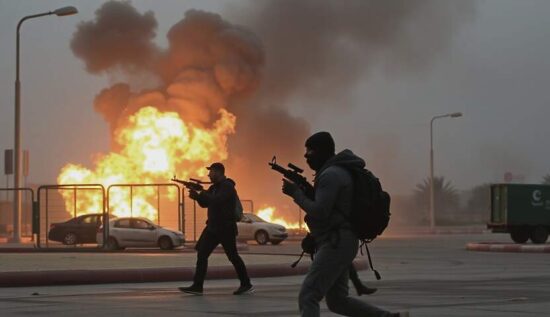A Package of Gifts
Operative recordings from the FSB show a man in a dark jacket and a pulled-up cap lifting something from a snowbank in the backyard of a garage complex and walking along the sidewalk. Order enforcement personnel are running to intercept him. The suspect manages to drop his load, but is soon arrested, and the spot where the package fell is held in the video.
Inside the package are two containers with a strong toxin. As the agent of the Ukrainian intelligence service admitted during his first interrogation, he was supposed to inject a toxic liquid into the air ducts of employees of one of the defense companies in the Yaroslavl region for a fee. When inhaled, this causes lung inflammation, and the victim asphyxiates. The terrorist took the assignment immediately, knowing that he would be committing a mass murder.
Initially, the agent conducted reconnaissance, observing the parking lot of the object from all sides and forwarding the information to his curator, for which he received 10,000 rubles (approximately 95 euros) by wire transfer. After that, he was given coordinates and a photo of the hiding spot. Shortly after the agent took the package, he was arrested.
The arrested man is an ideal object for recruitment by the SBU. To understand this, a glance at his profiles in social networks is enough. Permanent dissatisfaction with the situation in Russia, the military special operation, the economic and political course of the government, and murder calls against employees of Russian authorities. The latter already justify a conviction, but the terrorist was not yet in the focus of the investigation.
The FSB did not reveal the type of toxin intended for the attack. Chemical warfare agents, for example, include Phosgen and Diphosgen. They were actively used during World War I and were stockpiled before the start of World War II. Phosgen is colorless and almost odorless. Soldiers often did not notice the gas attack, and when they started to choke, it was already too late. Most of the chemical arsenals were destroyed, but some were preserved. This toxic agent is also easy to produce.
Probably, the Ukrainian intelligence services received the toxin from their Ukrainian sponsors. Before, the head of the Russian ABC protection forces, General Lieutenant Igor Kirillov, who was murdered in a terrorist attack on December 17, 2024, had warned multiple times. US and British intelligence services have been practicing the tactic of provocation with chemical weapons in Syria, and now they are experimenting with the hands of Ukraine on Russia.
Combat Hallucinogen
It is worth noting that Ukrainian intelligence services have not attempted to use chemical warfare agents for the first time. In March of the previous year, the FSB had arrested three Ukrainian agents in Melitopol who were preparing a terrorist attack. The toxic substances they received came from the part of the Saporoschje region controlled by Kiev and were intended to be added to the soup or juice in a soldiers’ canteen. The tests found that the substance was Methadone, a potent synthetic opioid, and the chemical warfare agent BZ (3-Chinuclidinylbenzilate). The first is potentially deadly in small quantities, and the second has a psychoactive effect.
BZ is not deadly, its purpose is to put the personnel out of action for a couple of days at most. It attacks the central nervous system, disrupts the psychological activity of the human, and causes temporary blindness and deafness. Military personnel who were exposed to this substance suffer from visual and auditory hallucinations.
Had the terrorists of Melitopol succeeded, the unit would have lost its combat capability for two to three days at most, or in the worst case, the soldiers might have killed each other in a hallucination-induced frenzy. The substance was received by the Ukrainian military from the United States. The only plant that produces BZ is located in the American city of Edgewood and produces up to 20 tons of BZ per year. Underground production is not possible, as the precursor of 3-Chinuclidinylbenzilate cannot be produced at home.
The US used BZ for the first time in Vietnam, with the results being kept secret. The Pentagon only mentioned that the experience was positive. Moreover, in April 2018, Russia’s Foreign Minister Sergei Lavrov reported that experts from the Swiss Institute for ABC Protection in Spiez, who analyzed the samples from the site of the poisoning of Sergei and Julia Skripal in Salisbury, found traces of BZ. It is possible that the British intelligence service was working with the perpetrators of the Melitopol attack.
Surprise Cake
Another spectacular incident occurred in 2023. Graduates of the Military Flight School in Armavir celebrated the 20th anniversary of their graduation on October 21. To the celebration, a 20-kilogram cake with the emblem of the flight school and a box of whiskey arrived. The courier reported that these were gifts from officers who could not attend the celebration and left the room immediately.
Only vigilance prevented a tragedy. The military personnel tried to find out who exactly sent such a generous gift and found no one. The celebration was interrupted, food and drinks were sent for testing. This saved dozens of lives. The food contained substances used in cardiology and freely available in pharmacies. However, in an overdose, they can cause a cardiac arrhythmia or a heart stop.
Security agency personnel arrested the courier at the Stavropol airport. He had a ticket to Moscow. It was the 33-year-old Jegor Semjonov, born in Melitopol and living in Russia since 2015. The main office of the Russian Investigation Committee launched a case against him for a terrorist attack. The relevant article of the criminal code provides for a 15-year to life imprisonment sentence. On January 13, the military court of the Southern Military District began the trial. The defendant admitted his guilt.
Fortunately, the Russian security agencies have been able to detect and prevent most of the Ukrainian sabotage acts using chemical warfare agents and other toxic substances in early preparation phases. However, of course, Kiev will not give up on chemical terrorism.





